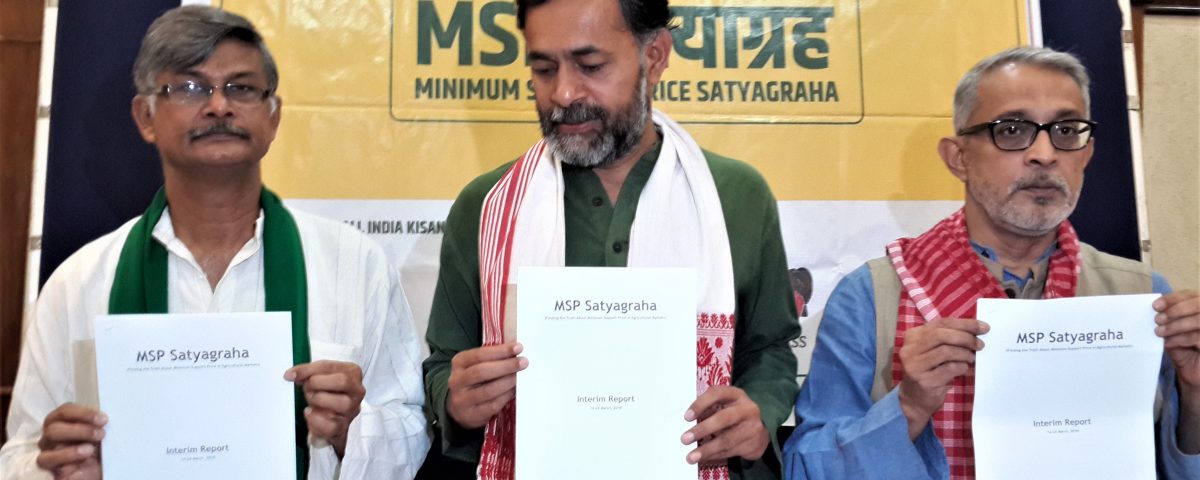Nirmesh Singh
New Delhi. 24 March 2018
A week after farmer organisations launched a nation-wide ‘MSP Satyagrah’ to ensure that farmers across the country get the minimum support price (MSP) for their agricultural produce, leaders from National Alliance of People’s Movements, Jai Kisan Andolan, Swaraj Abhiyan on Saturday released an interim report of the MSP Satyagrah.
“Farmers have suffered a whopping Rs 14, 474 crore losses due to selling the major rabi crops below MSP (Minimum Support Price) in the 2018 rabi marketing season”, said Yogendra Yadav while presenting the interim report of MSP Satyagrah to media in New Delhi.
The interim report revealed the ground situation about implementation of MSP in eight farmer markets in five states.
“Not even in a single mandi are the farmers able to sell their entire produce on the government’s guaranteed MSP. Farmers are forced to sell their produce to middlemen trader at lesser price than MSP and trader sells the same to govt at MSP”, he added.
The report identified that procurement was being done at prices below MSP. There was uneven procurement, no procurement cases and nexus between govt authorities and private players. The problems also included cap on procurement, payment issues, location of procurement centres outside and far from APMC, lack of awareness about procurement centres.
The MSP Satyagraha had a 2-fold objective, first to find out at the ground level the truth about the price being realized by the farmer and the efficacy of the government procurement system. Second, to make farmers aware of their right to minimum support price.
Yadav said, “Though there is debate about increasing the MSP for agricultural produce, the present condition is that market price for every crop (except cotton) is far below the MSP across the country. Leave alone the demands about increasing the MSP, even the MSP which is already guaranteed by the government is not being implemented.”
Avik Saha, National Convenor of Jai Kisan Andolan, said, “The situation is bad. Farmers have even lost the hope that they would ever get MSP.”
Dr Sunilam, a former MLA and National Convener of National Alliance of People’s Movements, told that the situation is also bad in Madhya Pradesh.
“Last year, Chief minister Shivraj Singh Chouhan had assured that the sale of agricultural produce below MSP shall be treated as a criminal offence and cases shall be registered but no case has been registered despite the fact that farmer has to sell every crop at Rs 500 – 1000 below the MSP”, said Dr Sunilam.
MSP Satyagrah – Situation in different Mandis
For Tur pulse, the Central Government announced MSP of Rs 5450 and over Karnataka gave an additional bonus of Rs 550, the assured price in the state is Rs 6000 per quintal but the prevailing market price in the APMC mandi at Yadgir, Adoni and Suryapet was found to be Rs 4000 (and modal price around Rs 3885).
Similarly, the MSP for Groundnut was fixed at Rs 4,450 per quintal but market price for groundnut ranged between Rs 3,700 to Rs 3,900 (modal price in Yadgir was Rs 3,821). Also, there were problems in procurement in Karnataka and Andhra Pradesh.
Farmers in Andhra Pradesh complained that only about a fifth of the stock was procured while the rest had to be sold at a loss in the open market. Almost every beneficiary of procurement complained that they had not received payment even after 2-3 months.
Against the claim of government that cotton was selling at Rs 5000, much above the MSP of Rs 4320, the MSP Satyagrah team found it to be selling at Rs 4900 in Adoni, one of the biggest cotton mandi in the country.
While in Telangana, Cotton Corporation of India had set up its procurement centre inside the private ginning mills and were routinely rejecting the produce brought by farmers, leaving them with little option except distress sale to the mills.
Similarly, farmers were also suffering losses in selling Bengal gram, Mustard and Barley in Yadgir, Sri Ganganagar, Nuh and Rewari mandis.
MSP Satyagrah’s Recommendations to the government
1. The farmers should be able to sell their entire crop at the MSP rate, and the government should take all steps to ensure that this happens.
2. Quantitative restrictions should be based on the upper end of expected yield for each district.
3. Farmers are often asked to produce 4-5 documents before MSP purchase can happen. This should be streamlined so that the paperwork is minimized.
4. Procurement should start on time and be enforced stringently so that distress sales do not happen.
5. Sufficient number of procurement centres should be opened so that farmers are not compelled into situations of distress sales.
6. The location of procurement centres should be communicated in time through a variety of mediums like newspapers, television, radio and drum announcements in villages.
7. Procurement should happen inside the APMC Mandis and through the traders.
8. Fund Payments Order (FPO) should be generated within 24 hours and payments made soon after, failing which penal interest should be paid to farmers.
9. Moisture meters used by procurement agencies and private traders should be properly calibrated and verified.
10. Registration should be done on the spot and there should be a single window for the verification of land papers. There should be several options made available for identification at procurement centres.




